English & Environmental Studies Professor Annie Merrill retires, community reflects
Independent Student Journalism Since 1914
Lizabella Nadelson ‘24
recounts the benefits of her summer experience with a Dean Rusk Grant
TArts and Entertainment Editors recap Frolics, review music and activities
The Yowl introduces new advice column for students
New Football Field Renamed “Field 76”
CLAIRE KELLY (SHE/HER) NEWS EDITOR
he Davidson College Stadium and Field House signals a new home for Davidson athletics and a new name for the College’s home field. Originally named “Fagg Field” after former football player and coach David Fagg ‘58, the new field will now be known as “Field 76” after Fagg’s jersey number.
Fagg was the captain of the football team his senior year and served as its 20th head coach for four years beginning in 1970. He was inducted into the Wildcats Hall of Fame in 2016. While recognizing his contributions to Davidson, many in the campus community felt uneasy about the original naming of the stadium due to its similarity to a derogatory term for gay men.
“It’s one of those things where, yes, that is his legal name but also you can’t ignore the implications that that word has and it also opens up a door for people to abuse that word,” said Queers and Allies (Q&A) Co-President Lucy Shuker ‘25.
Shuker expressed that Q&A strove to have larger conversations, drawing in the entire campus community, including LGBTQIA+ faculty, about the name of the field and its implications for the Davidson community.
“We had a lot of communication with Dr. Gonzalez [Chief Equity and Inclusion Officer and Associate Professor of Hispanic Studies] and a lot of communication with other queer faculty members about it,” Shuker said. “We tried to have some open conversations about it, but it was just one of those things where we [thought] there must be something else that you can call it [...] we can pick any other thing.”
Due to the backlash on the initial naming decision, Director of Athletics Chris Clunie ‘06 hosted a forum for student-athletes to discuss the change in October of 2022. No student-athletes came, so Clunie sent out a poll instead.
“I polled all of the scholar-athletes because one of the things that came out of that forum was, will scholar-athletes feel the ability to stand up for LGBTQIA+ rights,” Clunie said in an interview last fall. “We had a healthy dialogue just around the fact that athletics probably needs to do more to support LGBTQIA+ students like we talked about.”
Upon its completion this semester, the new stadium jumbo screen read “Field 76” across the top and included Coach Fagg’s name in
small print beneath, diverging from Davidson’s previous announcement. The College has made no official announcement of the name modification, but Clunie confirmed the change. All online reference to the field on the college website has been changed to “Field 76” as well.
“We made the shift last year, the last academic year [2022-2023]. [...] We wanted to name it that because Fagg is just a beloved figure in terms of what he’s given to this program,” Clunie said. Clunie also acknowledged that the use of the name of former Coach Fagg for a field required larger conversation. However, Clunie did not point to the name’s possible implications or misinterpretation specifically as the reason for the name change, and framed it more as a
equity, inclusion—we kind of live that out right now. But to ensure that it was a true celebration, because unintentionally, people outside may say, ‘Oh, this or that, whatever,’ so it was a way to honor the jersey retirement.”
Many coaches, including Head Football Coach Scott Abell, were involved in creation of the new field and stadium from the beginning, and therefore had seen many shifts in the process, including the naming. However, Abell did not comment on the discussion or reasoning behind the name change.
“I had some roles in different parts. I mean, I was probably a part of Ground Zero, meaning [...] a couple people who were part of the project from the very beginning till the end [...],” Abell

“Field 76” is being put to use for the first time this spring semester, after years of construction and adaptation. Orginally named “Fagg Field” after former football coach David Fagg ‘58, the field name was changed last school year. Photo by Claire Kelly
different way to honor Coach Fagg.
“Obviously the name in and of itself [...] [led to] a lot of discussions,” Clunie said. “We didn’t change it necessarily because of that [the name sounded like a homophobic slur], but what we ended up doing was, since we’re actually going to retire his jersey as well at the first football game in the fall, to tie the jersey to the field, we pivoted to call it ‘Field 76.’”
He added that retiring Fagg’s jersey number serves to honor the former coach in a way other than naming the field after him.
“It sort of ties in then that way, regardless of the name, because our intent, obviously, is not to dip into that term [Coach Fagg’s name] as a slur,” Clunie said. “It’s his name—but we wanted to sort of be sensitive at the same time. I believe the strength of the Davidson community is that we don’t just say we believe in diversity,
Asaid. “I would say probably myself and Chris Clunie [...] were probably involved with a little bit of every aspect of the facility in one way or another.”
While Abell expressed that he had been very involved in the project, he did not comment on its name change.
“[Coach Fagg] is a great part of the history and had a big impact in the fundraising part of this. And so the field being named after him was something that some of our alums who were very generous in this process felt strongly about,” Abell stated. “I really wasn’t involved with the name change at all, in how it came about, so I can’t really speak to that.”
Other coaches, who were not as heavily involved with the development of the facilities, also did not give specific reasoning as to why the name changed from “Fagg Field” to “Field
76.” Head Field Hockey Coach Zoe Almquist deferred to Clunie when asked about the name change.
“His comments speak for the athletic department as a whole,” Almquist wrote in an email.
Head Lacrosse coach Kimberly Wayne also explained that the naming process of the field was not a major discussion on her team.
“I am sure my players spoke amongst themselves during the naming process [of the field], but it was not a conversation I had with them. I had conversations with our administrative staff and my own staff, but it did not go beyond that,” Wayne wrote over email.
Although the exact reasoning behind the name change from “Fagg Field” to “Field 76” appears mixed, the excitement for the new facilities is clear. “Field 76” has many in the Athletic Department eager for the future. Abell believes that the location will make the campus community more lively overall.
“This side of campus has a lot more life to it if you’re asking me—we sit almost where a parking lot just was and now it’s going to give more life to all the facilities on this side—field hockey, baseball, you know we’re close to the eating houses here,” Abell said. “So I’m excited about that; I actually see more students now.”
In addition to the stadium itself, the lifting facilities are extensive. Evan Simon, Director of Sport Performance, emphasized that the facilities are a uniting effort for students across campus.
“I feel like our general students and our scholarathletes blend together in so many ways to where this whole project is really a statement of [not] just overall campus growth, but achievement from the student level working upward,” Simon said.
Abell echoed Simon’s sentiments.
“We all admit sports are a part of the culture at Davidson [...] [they bring] people together definitely right and so when you can bring people together for a better experience, no matter what it looks like, it’s awesome, and so that’s what I’m looking forward to from the fall.”
Clunie argued that the field’s importance lies not in the name of former Coach Fagg, but in the legacy as a former football player and coach that he left behind at Davidson.
“[Renaming the field] was a way to continue to honor Coach Fagg and to shift the attention from his last name to more of a celebration of him and who he was, and to honor his legacy,” Clunie said.
College Repairs Blue Light System, Boxes Remain Broken
Chief of Davidson College Campus Police Julian Coaxum and Director of Media Relations Jay Pfeifer explained why the system has been inconsistent in the past.
s students navigate Davidson’s campus, they might notice tall, bright blue lights mounted on poles that read “emergency” on their side. These “blue light call boxes,” located near places such as the Davidson College Well and the Chidsey basketball court, can be used to call 911 in emergency situations and are visual signals for individuals who are seeking safety. The system is touted on the College website as a part of Davidson’s crime prevention services, yet until recently, the system had been out of order on campus and many boxes remain out of service. Davidson College has had outdoor emergency phones since the 1980s, before cell phones were in common use. However, the blue light system has been unreliable and many students were unaware of its existence.
“Some of our outdoor emergency telephones have experienced reliability issues due to hardware failures that affected the phones’ ability to connect to the broader network,” Coaxum and Pfeifer stated over email. “The phones are outside and subject to the elements that can and have damaged equipment or wiring.”
Four of the units have been fixed by now, but three remain out of service.
“Technology & Innovation replaced the phones in four of the blue light pedestal units this summer, but this did not restore service on three of the blue light towers, which pointed to wider wiring issues,” Coaxum and Pfeifer wrote. “T&I has developed a proposal to replace the current land-line hardware in pedestal blue light phones with a cellular connection. The
wireless hardware is expected to be more reliable.”
According to Coaxum and Pfeifer, Campus Police worked to make up for the loss of the blue light system and ensure student safety without that resource. They also encouraged students to use their cell phones when and if they feel as though they are in an unsafe situation.
“Davidson College Campus Police have increased patrols across campus,” Coaxum and Pfeifer explained. “Cell phones remain the most useful tool, because a student can call while moving to a safe location. In order to have a conversation on the blue light phone, you have to remain next to it.”
Coaxum and Pfeifer shared that many students do not use the blue light system. According to Campus Police records, no one has tried to use the system for a “real emergency” in the past four years.
“Davidson is not aware of any direct impacts because the
CONTINUED ON PAGE 2
April 24, 2024
davidsonian.com Issue 21 Volume 122
Davidsonian
The 3 4 6 8 inside
ANNABEL GROSECLOSE ‘27 (SHE/HER) STAFF WRITER
News 2
Climate Activist, UN Advisor Speaks to Power of Youth Advocacy
Internationally acclaimed climate activist Sophia Kianni brought her expertise to Davidson last week. On April 15, the Center for Political Engagement (CPE) brought Kianni to campus for its inaugural annual political speakership series. That evening, Kianni shared her story with several students and inspired them to embrace climate advocacy in whatever form possible.
Kianni is only 22, but has had several accomplishments as an activist. Forbes Magazine named her one of the 30 most influential people around the world under 30 years old in 2023, and VICE Media declared her the 2020 Human of the Year. Kianni is also the youngest UN advisor in United States history. A climate science and public policy student at Stanford University, Kianni emphasized her position as a student to connect with the audience. Throughout her talk, Kianni drew upon her youth to insist that age should not limit advocacy. In doing so, she reminded Davidson students that they can — and should — get involved in climate activism as well.
While Kianni works on a global scale, her early environmental advocacy was personal. During her speech, Kianni recounted her first personal experiences with climate change on a trip she took to Iran, where some of her family is from, in middle school.
“My work is inspired by the palpable effects of climate change I’ve witnessed and the stories of people around the world who are already suffering its impacts,” Kianni said over email. “My family in Iran is experiencing climate change at a rate twice the global average, and this personal connection fuels my commitment to advocacy.”
According to the online journal Migration Policy Institute, approximately 800,000 Iranians have been displaced due to climate change-related disasters.
Kianni solidified her role as a climate activist in high school, when she went viral as the youngest person at a climate change hunger strike in Nancy Pelosi’s office. The
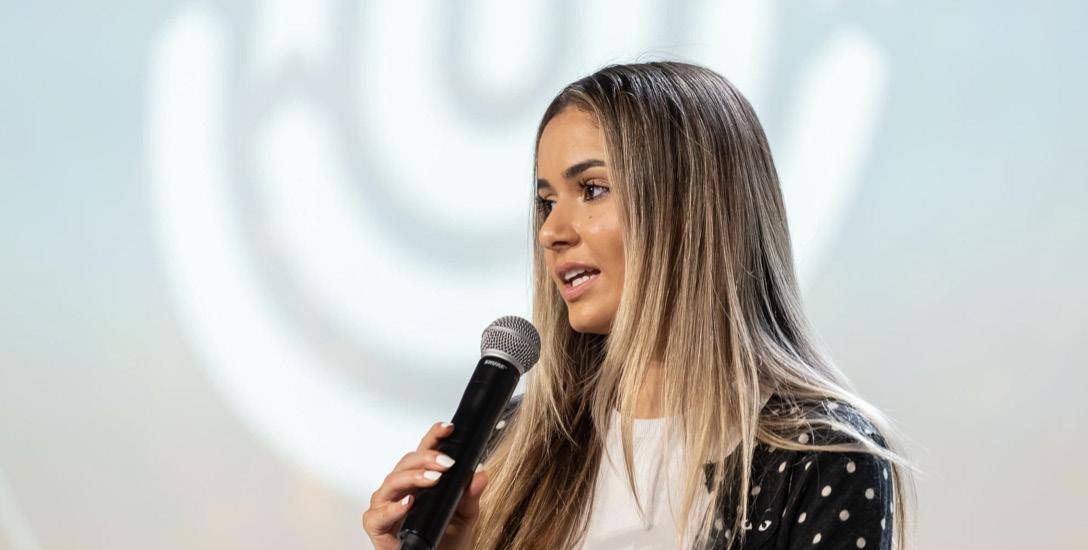
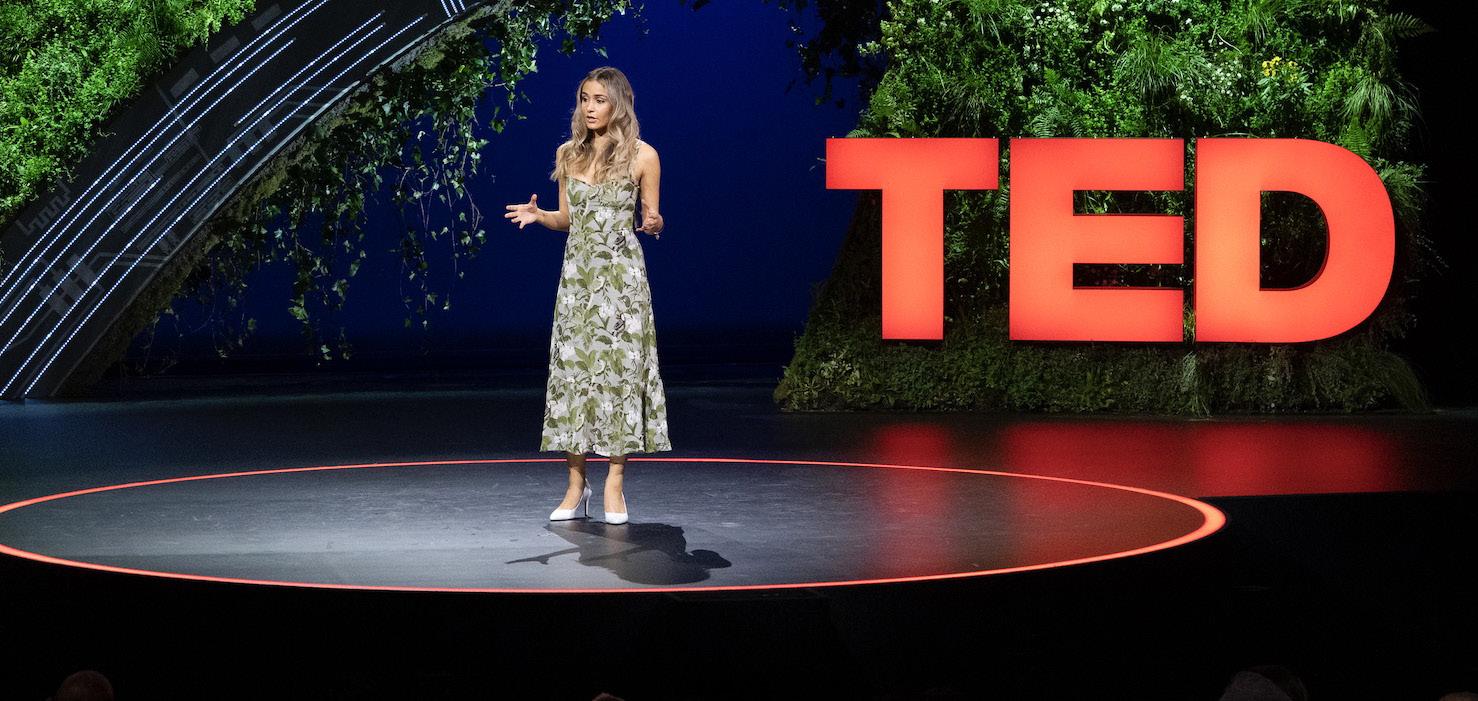
protest garnered national attention from many news sources such as Teen Vogue and the Washington Post.
“At 17 years old, I was by far the youngest participant and one of the only women,” Kianni wrote in a Teen Vogue op-ed. Despite that challenge, Kianni remained committed to the cause and found community.
“We were all there for the same purpose,” Kianni wrote in her op-ed. “That thought alone gave me immense courage.”
Kianni persisted and became a face of the youth climate movement. Now, she is the youngest advisor to the United Nations in history as a member of the Youth Advisory Group on Climate Change. She is also the Founder and Executive Director of Climate Cardinals, an international youth-led non-
profit that translates climate information into over 100 languages.
Throughout her talk, Kianni emphasized her own work in arguing that young people can make a difference. At 22, she is a part of Generation Z—a generation that, according to The Atlantic, has a reputation for social activism—and she trusts in her peers’ power.
“Youth are the future of climate advocacy,” Kianni said over email. “Young people inherit the consequences of current decisions and often bring fresh perspectives and urgency to the discourse.”
Activism can take many forms—in Kianni’s mind, the most important thing is getting engaged in the first place.
“I hope attendees left feeling empowered and knowledgeable about how they
can contribute to climate advocacy, understanding that their actions, no matter how small, can drive significant change,” Kianni said over email.
According to CPE co-president Sophia Ludt ‘25, the organization invited Kianni with the intention of raising awareness about climate change and encouraging students to continue conversations about environmental advocacy.
“CPE believes that environmental justice and advocacy is a non-partisan issue that we should all care about,” Ludt said. “It is our mission to spread awareness and promote education around the most prevalent political issues, which very much includes climate change discourse [...] students are becoming increasingly more aware of environmental issues on the local and national levels.”
Ludt also wanted to remind Davidson students of their capacity for impact.
“This year, we wanted to host a young speaker who could appeal directly to the lives of college students,” Ludt said. “It is so important to have confident, young, influential speakers like Sophia Kianni come to campus because they can be powerful forces of inspiration for students. Kianni’s experiences protesting could serve as an example of activism that may encourage students to follow her lead in promoting an issue that is important to them.”
Briana Harmon ‘26 is the co-voter registration chair of CPE and was directly involved in planning the event. Like Ludt, she thought that Kianni’s youth was inspiring.
“A lot of her conversation surrounded her youth, and how she has had the ability to make such an impact at a young age,” Harmon said. “We thought that message would be inspiring to the Davidson community. I think her youth made her more accessible as a mentor.”
Kianni’s, Ludt’s, and Harmon’s hopes seemingly materialized for attendees like Taylor McGibbon ‘26.
“I learned that you don’t have to know the answer to everything prior to starting,” McGibbon said. “I had basically no prior knowledge about what [Kianni] was saying. Now, I have more faith in youth activism.”
Campus Safety System in Need of Maintenance, Raises Concern
CONTINUED FROM PAGE 1
majority of calls for service originate from mobile devices,” Coaxum and Pfeifer said.
There are several possible reasons as to why students may rely on cell phones rather than the blue light system around campus. In addition to the location of danger far from the call box, students may not feel comfortable interacting with campus police.
“I think it would be different per student depending on what relationship they have with campus police. I feel like a lot of students would feel safer calling another student or calling their friend,” Valentina Silardi ‘25 said. Silardi is Co-President of Students Against Sexual Violence (SASV). “From what I’ve heard, they [campus police] are not very empathetic to students. When you’re a student searching for safety, you want to go to someone who’s gonna feel comforting.”
Grace Hertzinger ‘27 said that she might use her cell phone before the blue light system in an emergency situation.
“Whether or not I would use the blue light system really depends on the circumstances because I think that I rely on my phone a lot,” Hertzinger said. “I just always have it on me and it’s so easy and quick to call 911 or get help from a friend. Maybe I would use it [the blue light system] if it was there and I was panicking and I didn’t feel imminent danger. But I would definitely use my phone if I felt immediate danger. ”
Though some students expressed that they would use their phones in dangerous situations, others, like Clara Ottati ‘27, remain concerned about the previous unreliability of the

blue light system.
“Every time I passed by a blue light it said out-of-order, that makes me a little bit nervous [...] it’s not to the extent that I’m freaking out because this is a pretty safe campus but it really makes me wonder why they haven’t fixed it,” Ottati said. “I remember when I was visiting colleges, tour guides really emphasized the blue light system and how safe it made campuses.”
There is no mention of the blue light system, campus police, or emergency procedures in the 2023-2024 Campus Tour Manual. Regarding safety on campus, the manual only cites the Health Center as a resource for “[Wellness] checks, sexual health checks, free STI testing, and birth control prescriptions.”
Ottati was shocked to learn that they were back up and running and shared her annoyance that it has taken the college so long to fix the issue.
“I have a photo of a friend posing in front of one with an out-of-order sign on it from September. So it’s been all year that they haven’t worked,” Ottati said. “It’s kind of annoying how long it took them to fix it. The idea of not having anything there if I was in trouble and did try to use it is scary. I would’ve expected fixing them to be a higher priority for the college.”
Kianni won TED Talk’s Global Idea Competition at age 19. Photo from Sophia Kianni on X.
The emergency boxes are located across campus, including this one outside of
Chidsey
Hall. Photo by Claire Kelly.
SAVANNAH SORAGHAN ‘27 (SHE/HER) STAFF WRITER
Sophia Kianni is an Iranian-American activist and entreprenuer. At age 22, she is the youngest United Nations Advisor in U.S. history. Photo from sophiakianni.com.
Merrill Retiring After Decades-long Career at Davidson Features
BRIANNA PENNINGTON ‘27 (SHE/HER) STAFF
WRITER
After thirty years at Davidson, English and Environmental Studies professor Dr. Annie Merrill is set to retire as this semester concludes. Throughout her time at Davidson, Merrill has played many roles, from English and Environmental Studies professorships to chairing the Center for Interdisciplinary Studies. Merrill was instrumental in the creation of the Environmental Studies department at Davidson, which has since become the tenth most popular major at Davidson according to U.S. News & World Report.
“I would say that the legacy I am most proud of is leading and facilitating the process that got us an Environmental Studies major and an Environmental Studies minor and an Environmental Studies department [in the early 2000s],” Merrill said.
Merrill was involved in the Environmental Studies discipline even before the department’s founding and felt that it added depth to her original role in the English department.
“I have been teaching environmental courses since my second or third year here, when I was given, very generously, a named professorship in Environmental Studies, the Thompson Professor of Environmental Studies,” Merrill said. “So for years, even the many years that I was chairing the Environmental Studies department, I was still full-time in English. I think that [teaching both English and Environmental Studies courses] combined with my experience of coordinating the concentration, directing the concentration, and chairing the department gave me all that interdisciplinary work, gave me an insight into curricular structures [and] departmental structures that I could bring to the English department in ways that helped us all think in new and productive ways about the English major and the English department.”
In addition to her academic work, Merrill strove to cultivate a warm and welcoming community at Davidson. According to the current chairs of the English and Environmental Studies departments—Dr. Randy Ingram and Dr. Chris Paradise, respectively—Merrill is a kind, intelligent, and vibrant colleague.
“I’ve worked with Annie since she was here when I came to the college in 1995. She’s a really adventurous, smart colleague,” Ingram said. “I had the chance to co-teach with her a couple times in the senior English major class. There was once when she sort of dressed up as 19th century poet Walt Whitman in drag to talk about Whitman and gender. I will miss hearing her laugh from across the hall. Her energy, her openness, her generosity, her intellectual brilliance is going to be a lot to miss.”
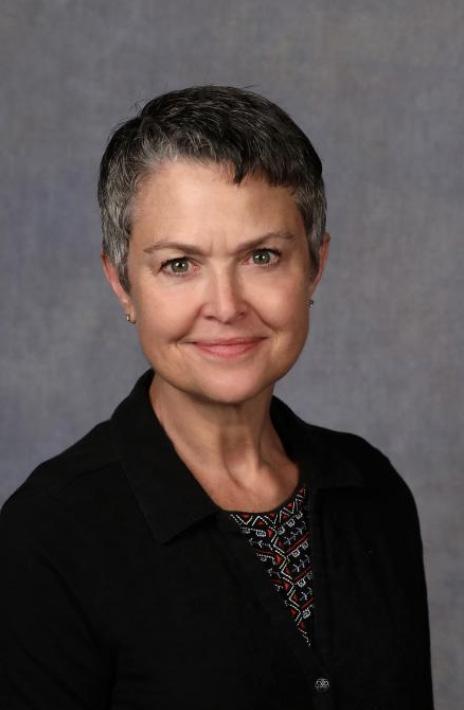
Paradise reiterated Ingram’s comments, emphasizing Merrill’s work ethic and willingness to collaborate with her colleagues.
“She gives her time and helps everybody with departmental tasks, volunteers to help with various things like search committees and mentoring junior faculty,” Paradise said. “I will miss her flexibility and generous nature.”
Merrill has also been a supportive presence for her students—for many of them, her office has served as a safe haven. Ronan Towell ‘24, one of Merrill’s advisees, shared that he felt more comfortable in her office than any other professor’s and recalled good memories with Merrill. “I had just come back from abroad in Denmark and so we were chatting about that and very nonchalantly she offered me a cup of tea. I was drinking it and as soon as I finished she was like, ‘Oh, by the way, that cup of tea has the strength
of three tea bags.’ That was a really fond memory,” Towell said. “Her office is full of books and such a beautiful place and I got to hang out there and chat with her, and she makes a really strong cup of tea.”
Merrill’s students attest that she cares deeply about them beyond the classroom and often makes sure that every student in a thirty-person class feels included.
“A moment I wish could be turned into a painting is when I came into her office and her dog was sitting on the couch with her and chewing on something while she was talking to me,” said Environmental Studies major Courtney Fortunato ‘24. “The dog just started making noise and she was just talking to her. That’s one of my favorite memories. I think just any time I’ve gone to office hours she’s always down to just have a discussion and see how you are beyond academics.”
The feeling is mutual. When Merrill reflected on her thirty years at Davidson, she highlighted her depth of appreciation for her students.
“I would say teaching has been the most rewarding part of the job for me,” Merrill said. “I entered this profession because I love to teach, and teaching Davidson students has been a privilege and a joy. That has definitely been right up there in terms of the top highlights of my experience here.”
Merrill continues to share her intellectual passions with her students even as she moves out of her office. While she cannot take her extensive literary collection with her to her home in Portland, Oregon, she is offering the books in her office free to a good home. Her collection includes an eclectic assortment of academic writings on English, the environment, and feminism and literary classics from Louisa May Alcott to Herman Melville.
After Davidson, Merrill plans on returning to the Pacific Northwest where she will enjoy spending time in the outdoors with her dog.
“I am moving to Portland, Oregon where I will live in a tiny home [...] I plan to do a lot of hiking which is something I love. I’ve got some interesting travel on the horizon, also something I love. My roots are in the Pacific Northwest, so I’m looking to getting back to those and just seeing what the next adventures are.”
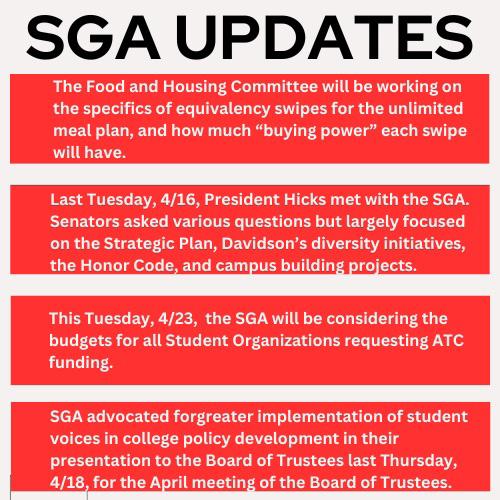
3
Time Reported Description/Location 04/20/24 01:13 hrs 04/19/24 23:46 hrs Assault Offenses: Simple Assault; Alcohol Offenses: Consume by Person Under 21 PCC 3#10 BSC, Inactive Injury to Property Offenses: Injury to Real Property Jamieson, Further Investigation 04/20/24 23:45 hrs Alcohol Offenses: Aid and Abet by Person Over 21 (x2); Alcohol Offenses: Possess Under 21 Little Library, Inactive
Annie Merrill is retiring after three decades at Davidson. The popular English and Environmental Studies professor is moving to Portland, OR. Photo by Davidson College.
Crime Log
Perspectives
Dean Rusk and My Exploration of the UK Healthcare System
Every student throughout the course of their education should have an opportunity to learn about the world outside of their state, country, and even continent. Exploring different ways of life is not only a gift, but also an opportunity to better understand our life at home and develop the ability to think more broadly outside of our personal experiences. Living like a local in a foreign country allows students to question and compare their own cultural values and the day-to-day routines that we often don’t notice or take for granted. Experiencing traditional cuisine and exploring architecture, art, music, and literature is vital in understanding a people and their shared cultural values. “To walk a mile in someone else’s shoes” is one of the greatest gifts anyone can receive, and my experience was possible thanks to the Dean Rusk Travel Grant.
The Dean Rusk Grants are awarded to students to pursue independent projects while experiencing life abroad and learning about themselves in the process. Grant proposals allow students the flexibility to focus on a particular project, whether it be research, service, or an experiential learning trip. Dean Rusk Grants are supported by the college and multiple endowed funds gifted by Davidson alumni, including former grantees. The purpose of these grants is to empower students to go abroad and learn about both themselves and the world in the process. Students can embark on their trip during either summer or winter break and must meet with the Dean Rusk staff prior to submitting an application and work to establish connections in their location of interest.
Having lived in the UK for two and a half months, the British lifestyle is truly unique. In London, pub culture is an almost professional-like obligation and getting around the city is as easy as hopping on “the tube” (a.k.a. the underground, “metro” in Paris, or “subway” in NYC) and the famous
bright red double-decker buses. London is a buzzing metropolis of things to see and experience. Free public access to the British Museum and the Victoria and Albert Museum (V&A) keep culture alive and accessible for anyone to walk in and be reminded of the beauty of the world. Preserving art and history in popular culture reminds us of our potential to make something great and share our abilities with the world. As a student of the arts and history, I was amazed by the V&A collection of famous Italian replicas of the David statues by Michelangelo and Donatello and the Florentine Gates of Paradise.
In addition to the rich exposition of art, history is a living thing seeping through the streets of London. Remnants of the Londinium still stand and can be seen by the surviving Roman London Wall dating back to 200 AD, continuing to protect Tower Hill. The gorgeous white facades of Regency architecture of the 19th century stand out in contrast to the black painted railings found throughout all of London, believed to be painted black in honor of the death of Prince Albert and Queen Victoria’s famous black mourning clothes. Even pubs have their own history (Pub: n. “public house,” an establishment for consuming a “bevvy,” slang for beverage or beer): each name of a pub is described as an animal, object, or royal title and is adorned with an accompanying image. The old saying goes that pubs were named so that people can discern the establishment by its accompanying image, e.g. The White Horse, Golden Lion, Churchill Arms, and The Green Man, amongst many others. Pubs are sprinkled throughout the city and can often be found within a block or two no matter where you are in London.
The goal for my Dean Rusk trip abroad was to learn about how the national healthcare system (NHS) works, gain clinical research experience, and experience the UK way of life from the perspectives of a tourist, student, and local.
The NHS is a fascinating topic from the perspective of a U.S. citizen. Since many Americans struggle with financial healthcare costs or insurance coverage, universal
healthcare systems such as the NHS have been suggested as a promising solution for the U.S. The sayings are mostly true: universal healthcare provides peace of mind financially when seeking emergency medical attention. Certain services in the NHS are free for anyone, including ambulance and emergency services (A&E), family planning services, and treatments for infectious disease. Although these “free” services are extraordinarily convenient for A&E, other healthcare services through the NHS pay a price. Chronic diseases that require specialist care and surgical treatment can often take months to over a year to be seen. According to UK House, waitlists for hospital treatments rose to its highest record of 7.8 million patients in September 2023. In one case, a university student waited two months for an appointment to diagnose an ACL tear repair, and then was placed on a surgery waitlist for an additional 6 to 9 months. Many patients struggling with hip and knee arthritis often suffer for months waiting on the surgery list or have to “go private” and pay £10,000£15,000 (equivalent to $12,500 - $18,750) for a single hip replacement only weeks later. The disparity between middle- and highincome classes remains apparent, especially in medicine. Problems with universal healthcare consist of many competing issues, such as limited government fund allocation, population growth, healthcare worker shortage, and increasing comorbidities. While the idea of universal healthcare in the U.S. may be appealing, the example from the NHS in the UK suggests that both patients and healthcare providers pay the price, either in convenience or financial cost.
My liberal arts education from courses at Davidson College such as ‘“Greek Art and Architecture” taught by Dr. Michael Toumazou and “Islamic Civilization and the Middle East” with Dr. Jonathan Berkey sparked my curiosity outside of the continental United States and developed my passion for understanding culture in the context of history and art. My “Problems of Philosophy” first-year course taught by Dr. Kevin Busch prompted me to question
A Past, Present, and Future Look into Climate Action at Davidson
Davidson College is on a mission to reduce greenhouse gas emissions by 50 percent in the next five years, using 2008 as the baseline year. Meeting this goal will lay the foundation to later reach the prestigious status of net zero. In addition to their potential in advertising climate action, “net zero” and “carbon neutral” have a much deeper importance for longterm sustainability policy. At face value, both terms refer to a state where all emissions are erased, offset, or otherwise counteracted in an accounting process. Unlike carbon neutrality, however, net zero balances all six greenhouse gasses (GHGs) listed in the Kyoto Protocol, not just carbon dioxide. Net zero is a more advanced state of climate accountability: it involves implementing science-based solutions to reduce emissions dramatically, and any leftover greenhouse gasses are neutralized by methods of equal climate impact and longevity. This definition is established by advocacy organization Second Nature, and other “green” terms are commonly coined and used seemingly as interchangeable synonyms for marketing purposes but hold no weight without an enforced definition. Buzzwords such as ‘climate-friendly’ or ‘nature-based’ commonly appear on products and services rather than institutional commitments like ours. Even official definitions change over time as well, and the Davidson CAP has chosen to emphasize measurable results rather than meeting criteria. Along with the Paris Accords and other landmark climate agreements, the American Colleges and Universities Presidents’ Climate Commitment (ACUPCC) forms the backbone of Davidson’s Climate Action Plan (CAP). Since former president Thomas W. Ross signed the ACUPCC in 2007, Davidson has developed plans for approaching various climate-related goals, including net zero. The first edition intended to hold the college accountable and set sustainability goals, however, as stated in the 2021 CAP, “[p]eer institutions continued to accelerate in sustainability initiatives, but Davidson has fallen behind.” Many higher education institutions (HEIs), Davidson included, have
taken a moral and social stance in favor of achieving net zero, as they have the financial, scientific, and industrial bandwidth to do so. The most recent revision of our CAP particularly emphasizes halving the 2008 campus emission baseline profile by 2026, a significant change from the 2010 goals. It prioritizes an aggressive, short term plan to address the bulk of our emissions to supplement the long-term targets.
Our goal as a college to rapidly cut emissions is attainable and follows the example of universities, governments, and corporations with similar objectives. Eleven American HEIs have already claimed carbon neutrality, and we have taken into account their successes, mistakes, and strategies to inform and design our current 2021-2026 climate action plan.
Within the 2021-2026 CAP, having an effective system to quantify emissions is a major focus. This is called carbon accounting, and is a necessary step for any organization that aims to reduce emissions (contrary to the name, this often involves multiple greenhouse gasses). The principles of carbon accounting recognize three types of emissions. Scope 1 emissions are derived from fuels burned on campus, Scope 2 from purchased electricity, and Scope 3 from indirect sources such as flights and college-owned vehicles. Our 2010 CAP specified a 15% emissions reduction by 2030. This was intended to largely take the form of power/travel conservation and energy efficiency policies. In comparison, our newest action plan is more detailed and direct about the college’s priorities, obstacles, and intentions. For example, the 2010 CAP acknowledged our total campus footprint but did not pinpoint the sources of our direct and indirect emissions. By setting goals in the new plan that are strict yet obtainable, we hold ourselves accountable to a high environmental standard because we can pinpoint, quantify, and visualize exactly where our successes and shortcomings are coming from.
The process of reducing an emissions profile combines implementing convenient and cheap changes alongside more systemic revisions. The newer CAP prioritizes five methods for future action: expanding renewable energy, improving electricity management, managing emissions from the boiler plant, reducing footprint of abroad experiences, and practicing responsible air
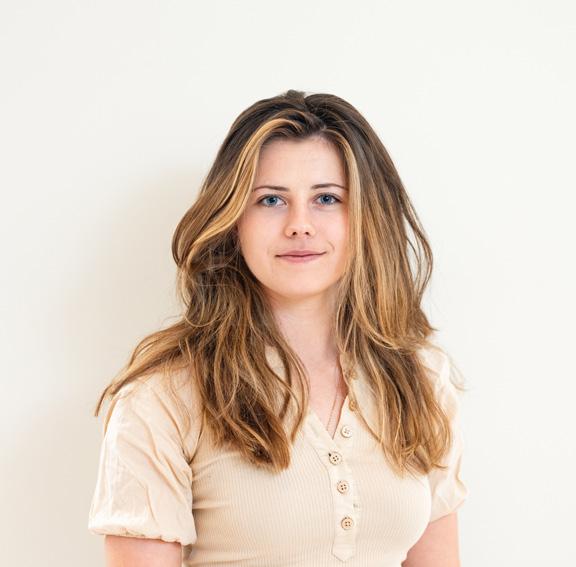
objective morality and understand cultures from a relativist perspective. The “Politics of Trade and Investment” course taught by former Dean Rusk Director Dan Crocker pushed me to develop counterarguments and proposals for international product, marketing, and business development from regional and global perspectives. Davidson College and Dean Rusk fostered my curiosity to learn about the world and allowed me to venture out of America and experience the beauty of architecture, art, history, and culture for myself.
Every student should get a chance to learn about the world around them and immerse themselves in the history and roots of a foreign culture. The liberal arts education provides students the skills and knowledge to think more broadly in both the humanities and sciences, and it is experiences like these through Dean Rusk that allow students to grow interculturally. My study of the NHS and the UK healthcare system has given me the knowledge and first-hand experience of how economics and healthcare organization play a crucial role in healthcare delivery and patient outcomes. My experiences abroad better equip me as an aspiring physician and in my future endeavors in healthcare organization and economics.
travel. Some of these changes will be incremental and small in their impact, while others will require extensive investments to reap a more substantial improvement. Transparent reporting makes any attempt at sustainability viable, and Davidson has established systems to do just that. The college publicly reports their emissions on the Sustainability Indicator Management & Analysis Platform (SIMAP) with Second Nature and in an annual GHG inventory.
Despite steps taken towards accountability and curbing emissions, our plans lack conservation initiatives. Our problems related to land management–extensive fertilizer use, erosion, and flooding–continue to fester. Other institutions of similar size acknowledge the ecological and social benefits attributed with conservation, yet Davidson has not taken on this responsibility. The forests surrounding our campus–particularly the 200 acres of the Ecological Preserve and 3 acres of the college farm–are at risk of meeting the same fate as the forest which once stood where Field 76 was erected.
However, conservation efforts can hinder further development. On the institutional scale, this is particularly concerning as the housing prices in the town continue to rise, forcing professors to live further from campus. Additionally, the student body has increased in size by 10.5% since 2012. The question arises: where are we housing these additional students? Currently, many are accommodated in the lounges of various dorms across campus, but it seems inevitable that we will need to continue expanding our housing facilities to meet the needs of the administration. As the college continues to grow, striking a balance between growth and land conservation will become increasingly complex. It is nevertheless critical, as climate change demands resiliency from our infrastructure and our policy alike.
Promoting a plan for sustainable progress as a whole is the first step in achieving our goals to reach net zero by 2050. The next step is to act upon it, both with our own actions and by holding campus leaders accountable. We hope that the maturation of the CAP both educates and motivates the Davidson community to build upon the momentum and keep supporting an ethical future.
This piece was written by students in the course ENV 380: Conveying Environmental Science to Diverse Audiences.
LIZABELLA NADELSON ‘24 (SHE/HER)
ISABELLA ACOSTA-JIMENEZ ‘24 (SHE/HER), ELLE SUTPHIN ‘25 (SHE/HER), AND BAILEY SCARLETT ‘25 (HE/HIM)
4
Thie piece was written as part of Nadelson’s effort to “give thanks to Dean Rusk” and “share opportunities” with other students.
Sports
Though the season hasn’t gone the way Davidson Baseball may have wanted thus far, there have been several bright spots. One is star catcher Jacob Friend ‘25, whose offensive prowess and defensive ability has made him a force to be reckoned with on the field.
“I think defense and offense are equally important,” Friend said. “I believe my defense is at the same level as my offense. I work hard to excel behind the plate and work with our pitchers to help create an environment where we can succeed together.”
Friend has impressive offensive stats. He has posted a batting average over .300, an OBP (on base percentage) over .500, and an OPS (on base plus slugging) of over 1.000, all of which are phenomenal figures for hitters. Possibly the most impressive aspect of his game, however, is his plate discipline. With far more walks than strikeouts, Friend has shown an ability to avoid swinging at balls out of the strike zone, which has resulted in his .507 OBP thus far.
“I’ve always been a very patient hitter, since my early Little League days,” he said.
When pitchers have challenged Friend in the zone, he has made them pay to the tune of 7 homers and a .557 slugging percentage. For the opposition, there’s no clear gameplan. Friend has been purely dominant in the batter’s box all year.
While Friend’s hit-tool has been obvious all season long to Major League Baseball (MLB)

scouts, he’s also succeeded as a defensive catcher and leader. Friend, who has solid framing and blocking technique, uses his quick hands and cannon of an arm to limit stolen bases. Wilson Perkins ‘26, a redshirt sophomore pitcher for the Wildcats, chimed in on how this has helped the pitching staff.
“Friend does a great job at controlling the run game,” Perkins said. “This allows our staff and I to focus just a touch more on the player at the plate.”
Pitching coach Joe Sheridan echoed Perkins sentiments.
“Teams that have run a lot against other opponents have been a little more reserved
against us when he is back there,” Sheridan said. “That allows us to keep double plays intact and keep runners out of scoring position.”
The numbers support their claims: through 31 starts, Friend has allowed just 14 stolen bases and has thrown out 8 runners.
In addition to his exceptional offensive output and his play on defense, his leadership and demeanor stick out as positive qualities that help the team be successful. Baseball is a game surrounded by individualism, and it’s easy to get down on yourself or teammates during the long season. Yet Friend always seems to stay locked in.
“Jacob’s positive demeanor through tough situations is the skill that sticks out most to me,” Perkins said. “No matter the situation, you can count on Friend competing.”
There’s no doubt that Friend has had a stellar season, and he has a clear blueprint for the big leagues. He aims to become the second Davidson catcher in as many years to be selected in the MLB Draft; Michael Carico ‘23, a 2023 5th-round selection of the Chicago Cubs, spent most of his junior season injured but slashed .406/.559/.843 with 21 homers for the Wildcats in 2022. Friend’s onbase percentage hovers around what Carico’s was, and with the increase in statistics being utilized across the MLB, getting on base has become a more and more coveted ability.
Friend hopes to begin his professional career with “a team that is focused on player development” so that he can keep improving as a player.
“I feel that I am ready and excited at the idea of competing at the next level, but also know I can continue to grow,” Friend said.
Sheridan trusts that Friend’s consistency will carry him to the next stage.
“There are certainly guys around the country who possess the same tools that Jacob has, but his ability to show up every day and do it is what separates him,” Sheridan said.
If Friend can continue to string together quality at-bats with his watchful eye, do his usual damage when pitchers dare challenge him, and eliminate would-be base stealers, he should be an intriguing prospect in the draft while hopefully leading a late-season turnaround for the ‘Cats.
While most students are settling into final exams, counting down the days until the end of this spring semester, the Davidson Women’s Lacrosse team’s season is just starting to heat up. With nine wins under their belt, the team has one more A-10 matchup against Duquesne before heading to the conference tournament on May 2nd. As the end of the season approaches, midfielder Josie Lambert ‘25 said that the “season has been really great for our team.” The team is excited for the upcoming tournament and Lambert believes that everyone has “been getting better with each day.” The improvement is evident, given their recent historic victory over Saint Joseph’s University. This was only the second time the ‘Cats have beaten Saint Joseph’s, and the first since 2015. “Our team was very composed and played smart throughout the entire game which ultimately led to our success,” attacker Julianne Carey ‘24 said.
Because of their “smart play”, the team was able to reach one of their season goals of being ranked 3rd or higher going into the A-10 tournament. Goal keeper Paige Doyle ‘24 claimed
that the big win was “euphoric” and is making the team look “forward to the tournament to demonstrate [our] growth as a unit.”
Together, the team has put up a very impressive record this season. They have a winning record and recently have improved to an astounding 7-1 at home. Coach Kim Wayne “feels great” about the upcoming games.
“[The team] has a lot of talent on the field and on the sideline, and it’s been fun to see how different people step up at different times,” Wayne said.
She believes that the team is a “top contender for the A-10 title” and it’s safe to say the team is excited about the possibility of proving themselves at the tournament.
Attacker Jenna Skibbe ‘27 said that the team is always “continuing to push [themselves]” and is looking to finish the season strong.”
With tournament play on the horizon, the Davidson Women’s Lacrosse team is ready to show off all the hard work they’ve put in.
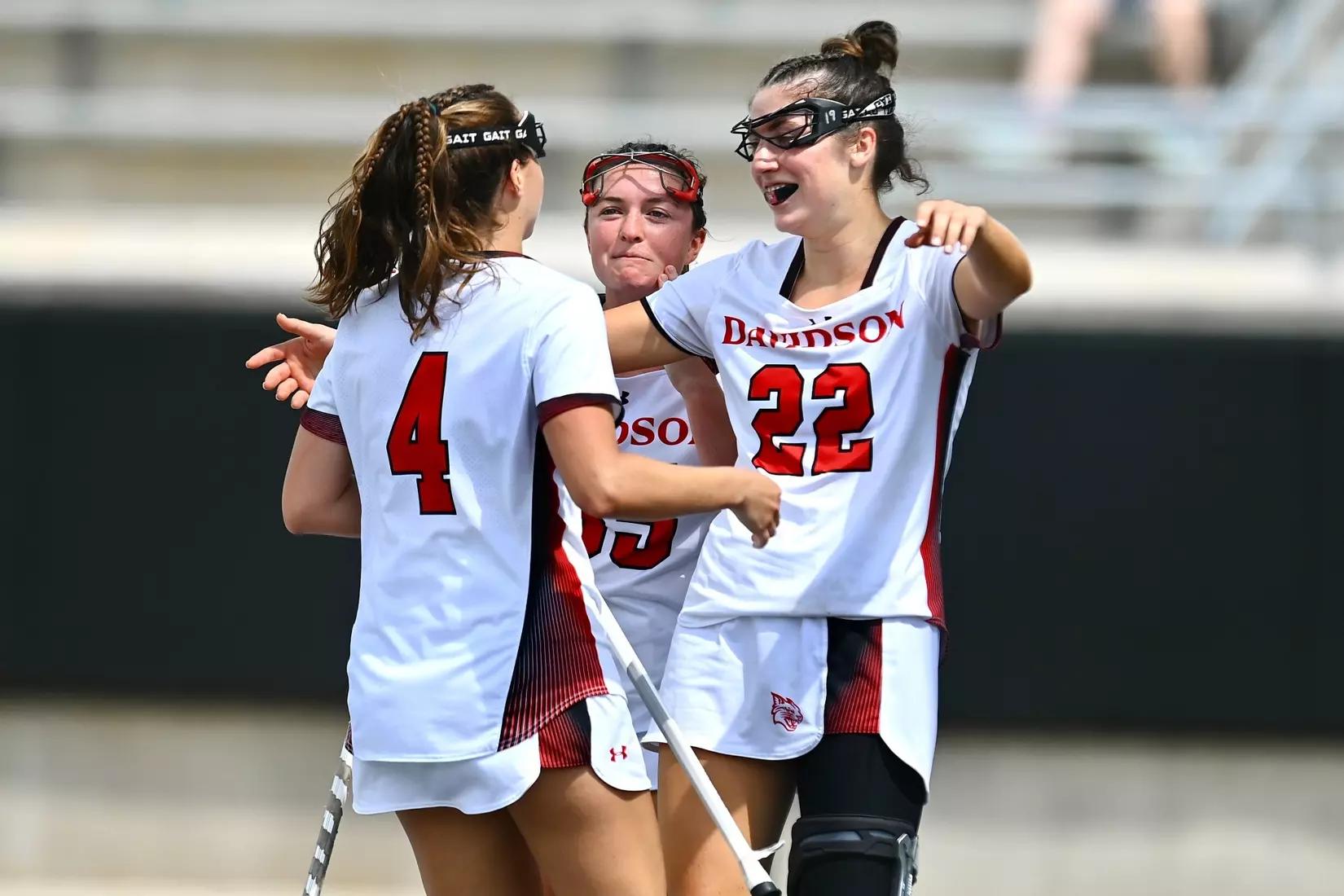
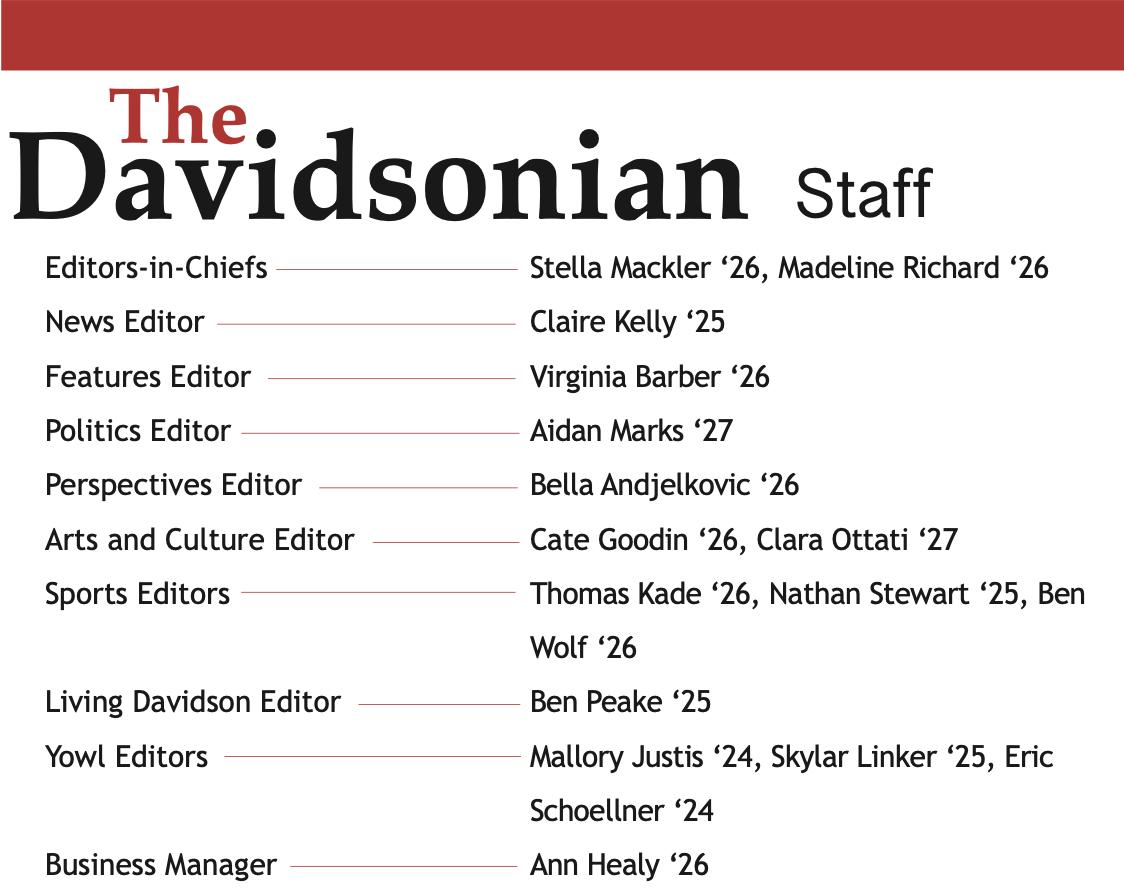
5
STAFF WRITER
Junior Jacob Friend Looks Toward MLB Draft HENRY RENDLE ‘27 (HE/HIM)
Standings Update Women’s Lacrosse Standings UMass Richmond Davidson Saint Joseph’s George Mason VCU St. Bonaventure Duquesne George Washington La Salle 8 7 6 5 4 4 3 2 1 0 0 1 2 3 4 4 5 6 7 8 1.000 .875 .750 .625 .500 .500 .375 .250 .125 .000 Team W L STK PCT W10 L1 W3 W1 W2 W1 L4 L2 L2 L9
LUCA LOVRICH ‘25 (HE/HIM) STAFF WRITER
Josie Lambert and Jacqueline Callahan celebrate a win over St. Bonaventure. Photo by Tim Cowie.
Lacrosse Team Heats Up With Big Win Over Saint Joseph’s
Friend ‘25 displays his offensive prowess with a big hit. Photo by Tim Cowie.
Arts and Entertainment 6
A JAW-Dropping Spring Frolics
CLARA OTTATI ‘27 (SHE/HER) & CATE GOODIN ‘26 (SHE/HER)
There was something in the water Spring Frolics 2024... Davidson students woke up Friday, April 19th to sunshine and anticipation for a weekend of festivities. While many students attended their Friday classes, the Patterson Court Council (PCC) lawn slowly started to fill by the afternoon.
This year’s theme, Jaws, promised water activities, 70s attire, and maybe a bigger boat? Swimsuits, the colors blue and red, and probably not enough sunscreen adorned the student body while Union Board was decked out in matching tees as they worked to make Frolics run smoothly.
For freshmen, the lead up to Frolics was a mixture of excitement and nerves as they prepared for what upperclassmen referred to as the best weekend of the year.
“I had no idea what to expect…” Josie Swain ‘27 said. “I was a little nervous, not gonna lie. All year all you hear about is ‘Frolics this, Frolics that, Frolics Frolics Frolics’...it was very daunting.” But overall, Swain noted that “[Expectations] were met.”
Older students knew a little bit more about what to expect.
“I feel like I didn’t prepare that much. I feel like I definitely drank more water this year than I did last year, which was good. And I talked a lot to my freshmen friends about it… I don’t think I did a whole lot. I think I probably hyped it up a lot less than last year, too, since I’d already been through it,” Kate Addison ‘26 said.
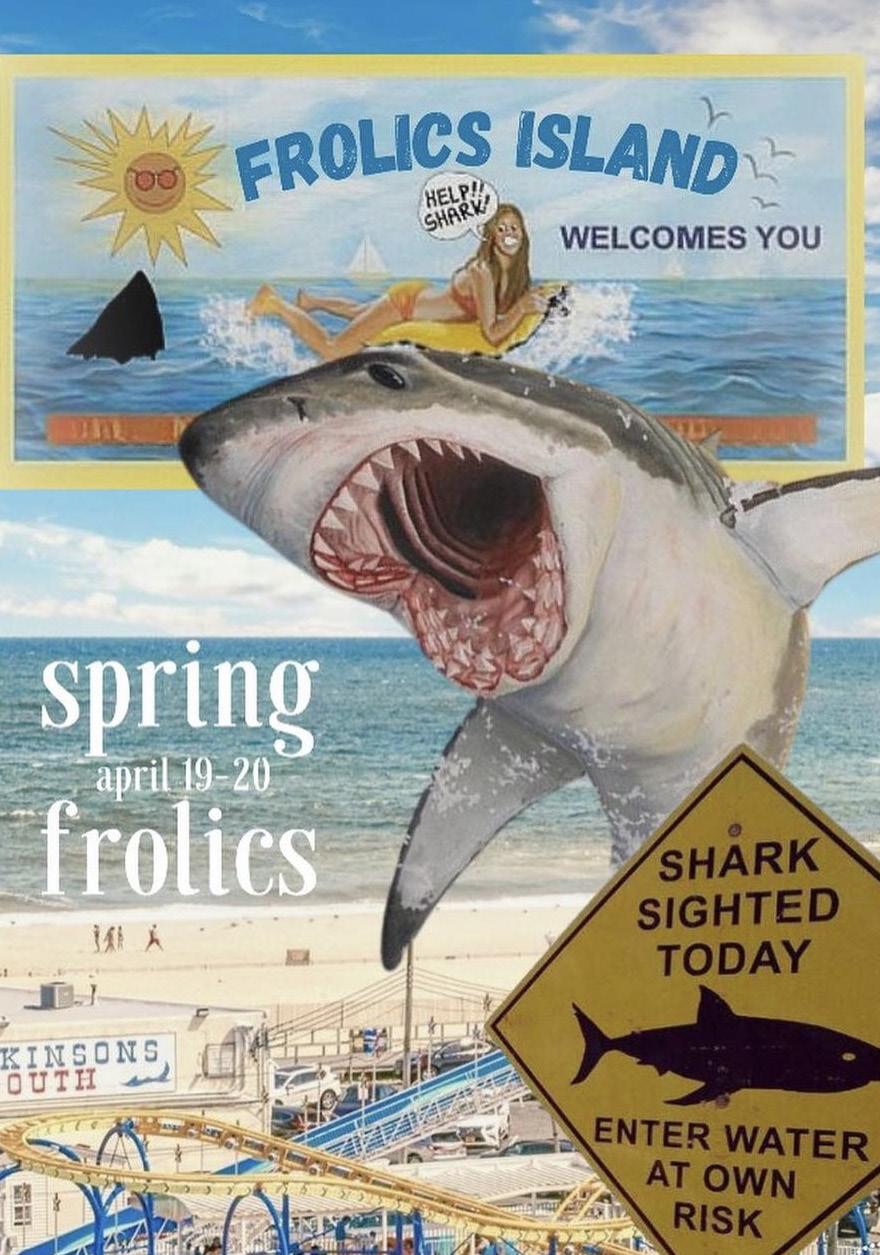
At 4pm on Friday, when Frolics officially began, one might have found themselves eating a cheeseburger outside Rusk, a crawfish outside Phi Delt, or perhaps singing along to some of the a cappella groups at Fiji. Of course, Nummit was still an option for classic Friday afternoon refreshments.
While the students were bouncing around the PCC lawn, we had some celebrities on the Old Tennis Court one. Davidson welcomed singers Briston Maroney and Del Water Gap to campus for a Friday evening performance.
Not all students were familiar with these artists, but were still excited for the event and tried to learn songs in advance
“For like, the week leading up to [Frolics], I would try to play some of their songs while…on walks,” Annabel Groseclose ‘27 mentioned when talking about how she prepped for the concert.
Others were already long-time fans of the performers.
“I definitely knew Briston Maroney,” Elise Desjarlais ‘26 mentioned. “I was just like waiting for him to check off the songs that I wanted. I thought it was great, I really loved it.”
Of course, knowing the songs was in no way a requirement to have an enjoyable time.
“Jumping around, even though we don’t know the lyrics, and bumping into people… It was cute and fun,” Grace Hertzinger ‘27 said.
Similarly, Meya Petsch ‘26 said her favorite part was trying, and failing, to interact with the band members. “I held up my
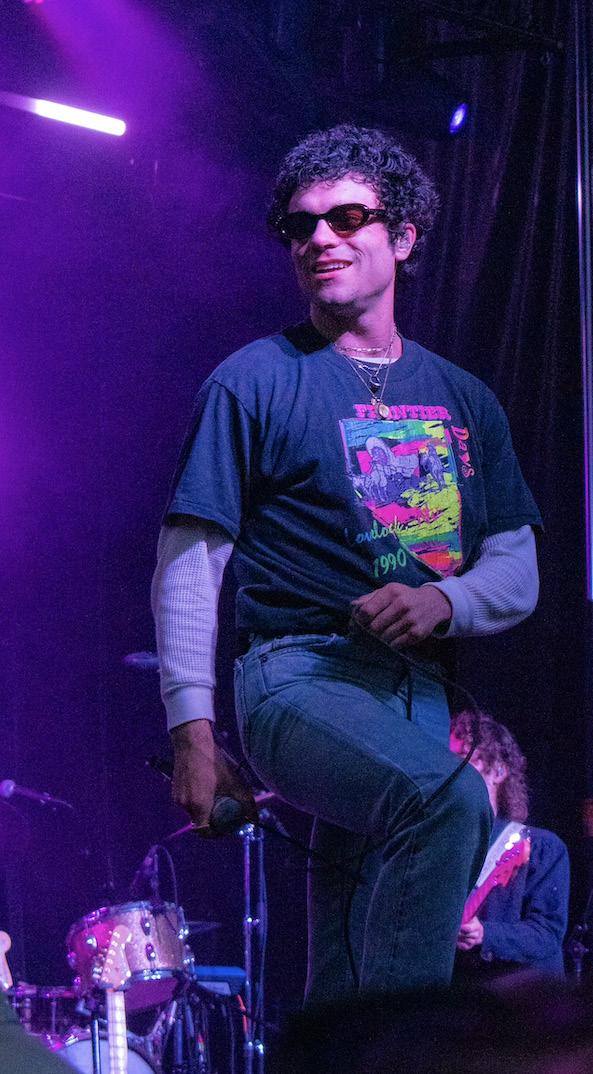
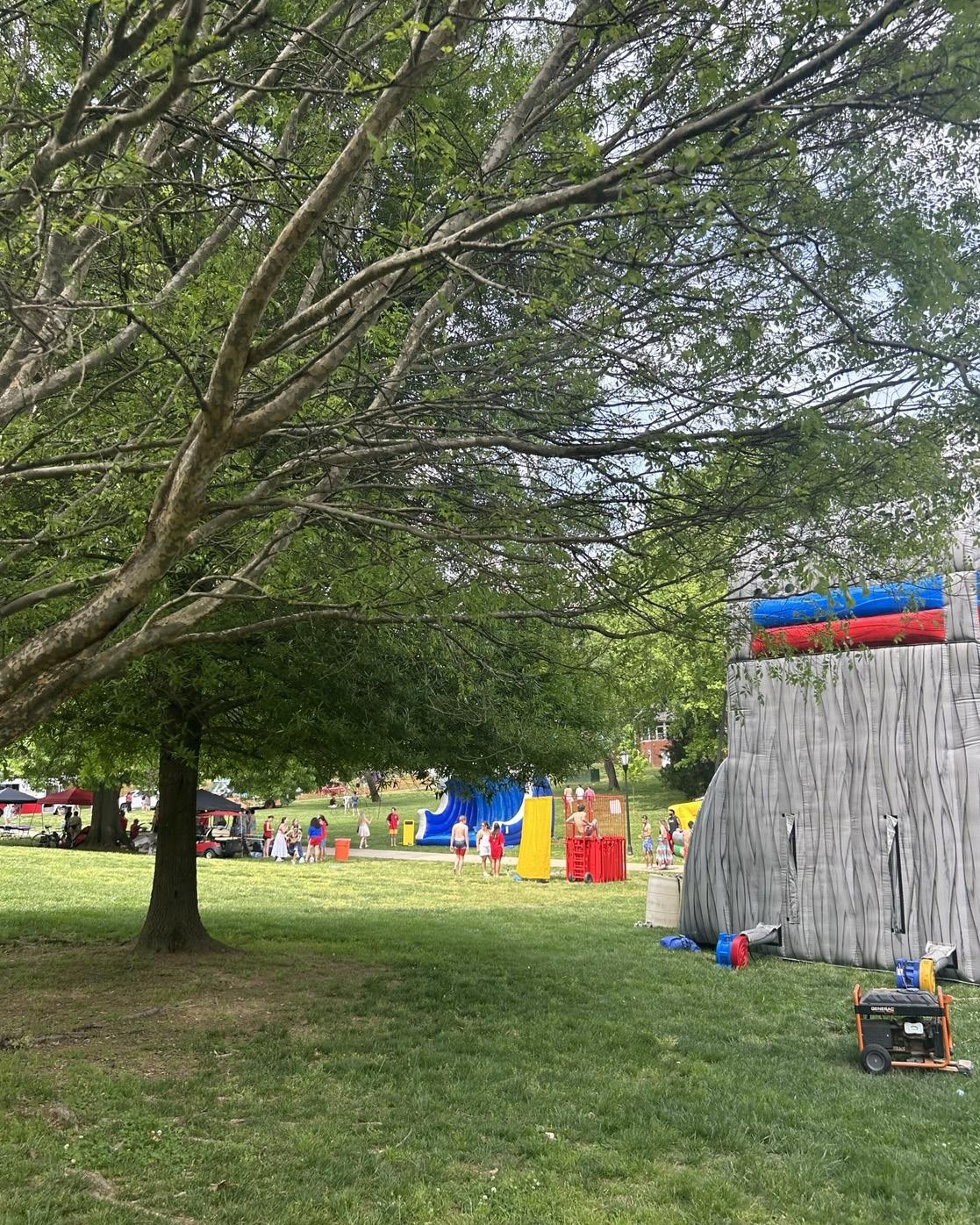
phone and it said ‘BRING ME ON STAGE’ but [Del Water Gap] just shook his head. Extremely devastating and I don’t think I’ll ever get over it, but other than that it was awesome.”
The concert took a year of planning. Union Board Concert Chair Auden White ‘26 gave insight into the logistics of the event: “the process involves approval from 40 different people and five organizations. First, that’s the promoter that we book through, then we go through tech services to see if we can actually technically do the show, then we go through legal, then we go through Concert Committee, and then Union Board.”
White leads the Concert Committee, a group of students dedicated to surveying the student body and bringing different artists to campus throughout the year. Frolics is their biggest event, and according to White, the event’s artists are decided collaboratively.
“I’ll pitch a slew of artists all together to the committee, and then they decide on them and then vote on them,” White said.
After a night of music, Saturday brought an entire day’s worth of shark-themed activities. A dunk tank, water slide, and surf machine all encouraged students to get into the
beachy spirit, while many students sported shark teeth face paint designs.
Desjarlais pointed to the dunk tank and water slide as her favorite activities of the day. “I did [the dunk tank] so many times [and] did it with my friends. I got kicked in the face on the waterslide. And I’ve never been in a dunk tank before… It was more painful than I thought. I didn’t realize that it’s just not that… it’s not that deep.” Despite these (minor) aches, Desjarlais added that these moments were “all part of the fun.”
Swain had “a great time on the surf ride thing. I mean, I fell off almost immediately, but it was great… Shoutout to Katherine Marshall [Major Events Chair], she did a great job bringing that in.”
Swain wasn’t the only student to fall victim to the surf machine. When asked, all Petsch had to say was, “Let’s not
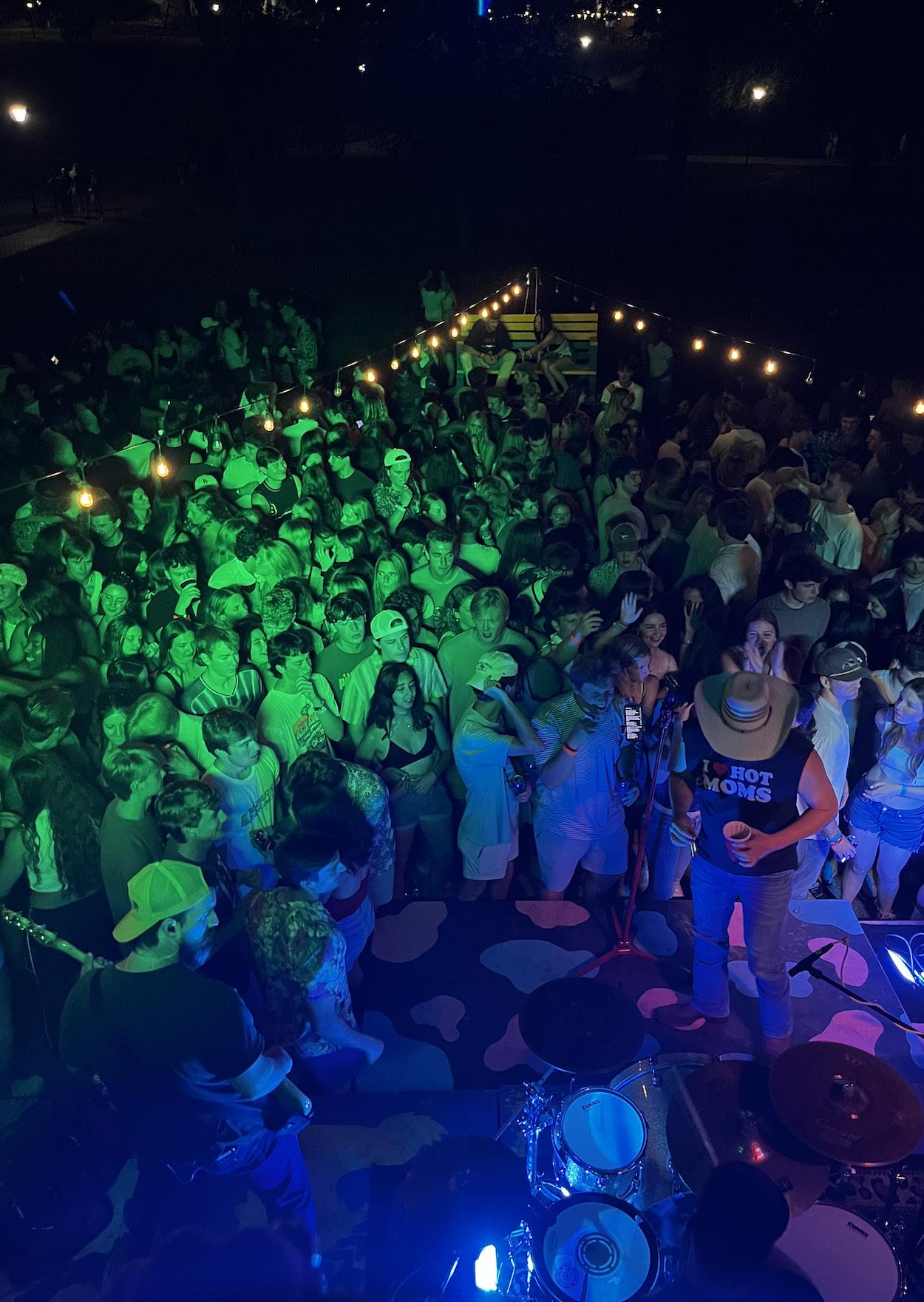
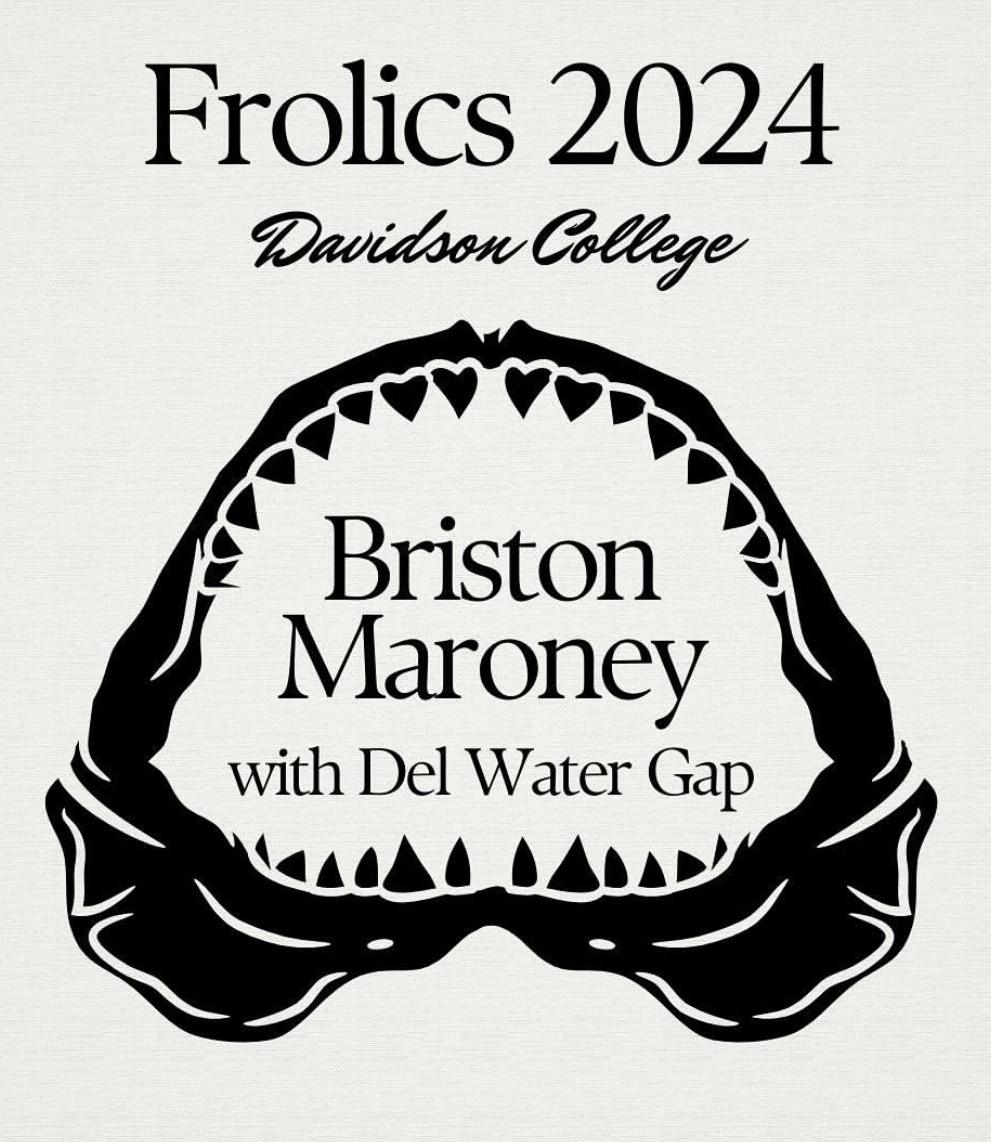
talk about that.”
A favorite tradition–over fifty years old–Frolics remains a constant for the student body, but always with a little variation and flexibility from year to year. From the concert to the food trucks to the water activities, and the associated PCC events, the weekend felt never-ending (but we were all probably a bit ready, come Sunday morning!). As Addison said, “It was fun to be able to do whatever you wanted to do with it.”
Clara Ottati ‘27 (she/her) is an English major from Chicago, IL and can be reached for comment at clottati@davidson.edu.
Cate Goodin ‘26 (she/her) is an English and Art History major from McLean, VA and can be reached for comment at cagoodin@davidson.edu.
SECTION
CO-EDITORS
Patterson Court Lawn was alive with activities during Frolics. Photo by Cate Goodin and Clara Ottati.
Some students concluded Frolics with a Saturday night band party. Photo by Kaspars Golas.
Del Water Gap performed Friday evening. Photo by Caroline Lockyer.
Union Board put together a Jaws themed Frolics, complete with shark references. Graphic by Union Board.
Union Board brought Briston Maroney and Del Water Gap to campus. Graphic by Union Board.
Living Davidson
Describe your Frolics and I’ll Tell you Where to Get Dinner on Main Street!
Hello readers! I hope that you are all mostly recovered from the weekend (however you decided to spend it). If you are not fully recovered, then you’re still obviously well enough to take this quiz below, considering you’re already reading it. No turning back now! Besides, how else are you going to decide which restaurant to avoid Commons with tonight? Just answer these questions about your weekend and all will be decided for you.
Did you darty on Saturday?
Firstly, what time did you start frolicking on Friday?
A - As soon as I woke up! Frolics is the whole weekend, and you intended to make use of every minute of it.
B - You started your frolicking on Saturday instead!
C - When it officially started: 4 PM.
D - The concert was the first thing you made it to on Friday.
ANSWERS BELOW!
Mostly A’s: Mandolino’s - Take your friends out for a nice dinner full of carbs - it seems like you may need it!
Mostly C’s: Carrburritos - The extra walk is worth it for the chips and guac! And maybe the margaritas…? If you’re able to partake this soon after the weekend, of course.
Where did you get food to sustain your frolicking?
A - You didn’t realize you had been DoorDashing that much until you opened your bank account on Sunday…
B - Commons all the way. Walking around the whole building every time was annoying, but worth it.
C - Mostly other food options - raiding PCC fridges, Davis Cafe, etc. Your dining dollars are officially drained.
D - You sustained yourself exclusively on Nummit bagels, for better or for worse.
Mostly B’s: Masala Mastee - Whether it’s a full meal eaten outside where you can people-watch or samosas to go, you deserve some spicy food after a full weekend!
Mostly D’s: The Pickled Peach - A classic pick. Have fun running into approximately three first dates along with every person you’ve ever had a class with!
THE DEATH OF A LOCAL - REST IN PEACE ELLIE MAY’S
BY: MARY MOLLOY BLACKSTOCK ‘26 (SHE/HER), ANNA NIEPOLD ‘26 (SHE/HER)
The weather has been getting warmer. A few weeks ago, after an especially hot day, we had an insatiable craving for ice cream. Last year, there was only one place we’d go, and no, it wasn’t Whit’s or Ben and Jerry’s. Whenever we could, we went to Ellie May’s Dang Good Ice Cream. All of their ice cream was homemade, and delectable flavors like Lavender Honey greeted us at every visit. You may observe that we’re using the past tense to describe this legendary place. That’s because a few weeks ago, we hopped in the car to go fulfill that aforementioned craving and instead found that everything had changed.
The first ice cream outing of the spring semester was upon us. We put on our favorite Zach Bryan songs and rolled down the windows for our seven minute journey to the little shop at 1827 Shearers Road. Despite being such a short distance from campus, Ellie May’s felt like it was worlds away. We drove past cows, goats, and rolling green hills. With every minute, our excitement grew. Until that fateful moment. Spoiler alert: our stomachs remained unsatisfied. We pulled into the parking lot. There were no other cars there. In place of the familiar sounds of twangy country music that used to fill the air around Ellie May’s was only the crunching of gravel as we rolled in. Surely it was just a misunderstanding. Maybe, we thought, it was just that nobody wanted ice cream on a Sunday night. Maybe Ellie May’s was just waiting until it was truly summertime to open. We parked the car and got out to look around. We hadn’t been able to find the opening date for Ellie May’s online, so we figured that they would surely have it posted somewhere. However, we were met with no answers, just blank walls and closed doors. We left heartbroken, but still clung to the hope that we had just misinterpreted the opening date. Maybe there was a small slip of paper we had overlooked, but we trudged back to our room knowing deep down that something was wrong.
From that day on, our lives were forever changed. How does one cope with loss? There’s no right answer. We all process grief in different ways. Some say there
A - Yes, totally! You spent hours on the lawn, getting food and face paint and going on the water slide.
B - Yes, but you got absolutely covered in foam early on, so you had to go shower in the middle of the day.
C - No, you were recuperating to make it out Saturday night instead.
What was your favorite moment of the weekend?
A - Spending time with all of your friends at once!
B - Del Water Gap x Briston Maroney concert, obviously.
C - Playing all the inflatable games that were not necessarily meant for people your age.
D - Going to bed Saturday night after a successful two days.

Left:
Creamery
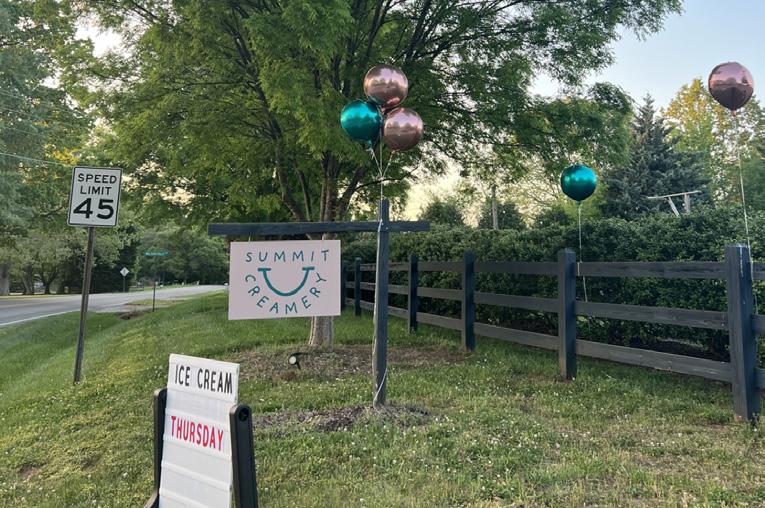
May’s,
good.
are stages: denial, anger, bargaining, depression, and acceptance. We felt every single one of those wash over us, crashing like tidal waves.
A few weeks later, one of those recommended Instagram pages popped up on one of our phones. The page was titled “Summit Creamery.” What was going on? Surely, this was a mistake. Maybe Instagram believed we lived in another state. Another country? Maybe this was for some new ice cream shop in California? Davidson already has a sufficient selection of places to go for ice cream, and Ellie May’s was the undisputed leader of the pack. Summit has expanded rapidly, so we figured that they were taking their talents outside of Davidson (like we mentioned, maybe in California?). This was wishful thinking. The denial stage of grief, even. The page posted an address. It was all too familiar: 1827 Shearers Road, Davidson, North Carolina. There were videos that included the iconic Ellie May’s ice cream doorbell. This couldn’t be real. We immediately texted one another in all caps to communicate our devastation.
Even the Ellie May’s website is now gone, erased without a trace and glossed over like the logo on the walls of their old building. The new Davidson logo has been criticized as a waste of money. A devastating and soulless Canva font creation. We’re here to say that we have a new appreciation for that hideous little “DC,” because its uninspired design pales in comparison to the bland and tasteless, barren and millennial teal and pink little smiley face that is the new Summit Creamery logo. The smiley face doesn’t even have eyes. Truly soulless. Why would you ever try to fix what doesn’t need fixing? Why would you attempt to improve on perfection? Those are the questions we wish we could pose to the owners of Summit Creamery. Ellie May’s was a masterpiece of an ice cream shop. The epitome of quaint, cute taste. It’s like watching someone cover the hand-painted wallpaper of a gorgeous old home with lime-washed shiplap.
We must admit, however, that sometimes shiplapped walls aren’t hideous. A few short days ago, we braved Shearers Road once more. We rolled down the car windows, opened the sunroof, and hit play on our summertime playlist. We even took pictures of the cows we saw on the way. As much as the loss of our treasured Ellie May’s devastated us, we knew we had to go see what had taken her place. And we can’t lie to you: Summit Creamery was actually pretty good. While nothing will ever truly fill the void left in our hearts, we wish only the best for the new Summit Creamery and urge you all to try it for yourselves.
While Summit
isn’t Ellie
their ice cream was still
Photo by Anna Niepold. Right: Summit Creamery had their grand opening last Thursday, April 18. Photo by Anna Niepold.
THE NEW YOWL TIMES
Irreverent student journalism since 2004. Castigat Ridendo Mores.
yowl.com/games
The Sustainability Office Hands Out
Thousands of Plastic and Metal Pins
Page Pollution for a Good Cause
April 24, 2024
The Rebrand Issue inside Fox On Campus Becomes the New Harambe. Dicks Out for Richardson Stadium Fox
Page Justice for Fox
Sugar Baby?
Davidson Pays No Taxes, Just Received $85M, and Now Gets Tax Credits
Page Monthly Allowance
New Yowl Times Confessions
Dear Advice Aardvark,
I spent the entirety of my 50-minute class playing the mini crossword puzzle and I still couldn’t find the right answer. What should I do to be better at word games? I can’t keep struggling this blatantly in front of my classmates like this.
Sincerely, Lost and Confused
To Lost and Confused, Maybe class is too difficult for you. Sounds like you should go back to elementary school.
Dear Advice Amanda,
I saw my significant other lookup hints for the wordle. I was shocked. Our relationship started with flirtatious wordle competitions. I asked them to be my lover after they got parer in only 3 guesses. Ever since this event, I have noticed other concerning trends, like how they never write anything and just ask me to write for them and they always misspell my name. I took a peek into his room and discovered only BOB books, Goodnight Moon, and the Berenstain Bears. I feel used and manipulated. What should I do?
Sincerely, Literate Lilly
Dear Literate Libby,
Your SO is illiterate and you should send them to the honor council for cheating on the wordle. If being dominant is your kink I say teach him how to read with some Magic Treehouse books, however, if not drop him off at Davidson Day night school and drive away never looking back. Don’t send a break-up letter they won’t be able to read it
Sincerely, Advice Amanda
Connections: Davidson Themed


Connections: Mystery Themed


Dogs Out on Chambers Lawn Event Turns Out to Just Be ENV Majors
Page Grounded
Several Pre-Vets Hospitalized After Trying to Handle Fox on Campus in an Attempt to Get More Pre-Vet Hours
Page Worth It
Davidson x Celsius Flavors
Vibe
The fleeting feeling of seeing the woman you once loved, where when you look in her eyes you see the memories and joy you used to share but can no longer access or remember under the weight of your current unhappiness and malaise vibe
Student Body Survey: Have you found an internship for the summer?
1. No fuck off
2. Yes with the New York Times. I got it through my media tycoon father who will pay for me to travel around the world.
After two responses this yowl writer became discouraged and gave up.

Wondering why there are no long form articles in the Yowl?
Note: The Yowl is a satirical supplement to The Davidsonian Hence, nothing in it should be taken as truth. WRITERS March but with an e Almost Ghosted Editborger Yowl The
The writers and editors were hung over from Frolics and have finals too
BORGS OF THE WEEK 1. Borg of Trustees 2. Smorgas Borg 3. Davidson Uniborgity 4. Del Water Borg 5. The Challenger Borgsplosion 6. The Davidborgian
Duke Endowment Vibe 2. Davidson
4. Glacier Gulp 5. Davis Cafe sushi vibe 6. NYT Game Failure tears vibe 7. Legacy Admissions vibe 8. Sidewalk Slammer 4 Loko (American Flavor) vibe 9. Showing up too late
Nummit on Wednesday
a table and
to stand a little bit
far away
see
heard at the back + Passion Fruit Vibe 10. Have a Job for Life Vibe 11. When You Don’t Have to Immediately Shit Post Commons Vibe 12. Commons Market Before 10 PM Vibe 13. Oscar Meyer Weiner Mobile Alumni Networking Event vibe 14. 5,000 Sustainability Earth Day Pins vibe
1.
Unicorn
3.
to
and not finding
having
too
to
or





















